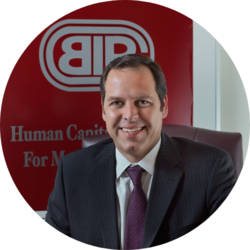
Hiring the right people is always important, but hiring the right talent for top-level positions is absolutely crucial, as they have the potential to impact a company’s direction and culture to a magnified degree. Finding the right fit also significantly increases retention rates. After all, job satisfaction, which is the number one retention factor, is a natural result of “company environment and the degree of comfort an individual employee feels within it” (Harvard Business Review).
So, how do you know if the executive you hired is the right fit for you and you for them? Honestly, only time can fully and unequivocally answer that question. However, by performing the proper due diligence, you can significantly increase your chances of (and confidence in) hiring the best candidate fit for your organization.
Evaluate Your Culture
Find ways to rigorously evaluate your company culture by taking a hard look at how your managers manage and how your employees work and communicate. You can learn a lot through observation, feedback, and even (if time and budget permit) hired consultants. Following are some examples of the types of questions for which you might need to find honest answers:
- Do your teams/individuals work collaboratively or independently?
- Are decisions consensus-driven or authoritative?
- How do you communicate?
- Are your meetings serious or relaxed?
- What types of people tend to succeed in the company?
- How are you structured in terms of hierarchy, authority, and reporting?
- How do you reward success?
- What happens when people don’t meet expectations?
- What are your expected work hours, and are they met?
- Do you have an open environment or closed office doors?
- What is the dress code?
- How do you have fun? (DO you have fun?)
Once you’ve discovered the answers to these questions, ask yourself: “Are we looking for someone who will balance, reflect, or change this culture?” You have to know who you’re looking for before you can find them.
Find the Right Skills; Then Look Beyond
Almost certainly, you have a job description written out listing the required skills a successful candidate must have. However, skills are only one factor that contributes toward a holistic fit. Applicants’ worldviews, values, expectations, and personalities also play a large role in how comfortable they’ll ultimately feel working for you (and vice-versa) and consequently how long they’ll stay should you hire them. To learn this valuable information about a prospective hire, you must implement strategic pre-hire assessments. According to the Aberdeen Group research, companies that utilize these kinds of pre-hire assessments report a 39% lower turnover rate.
First “Audition” Them for Skills
When Broadway producers look to fill their star role, they don’t merely peruse the actor’s resume and then sit down to interview them. They require the hopefuls to audition and demonstrate their mettle. Similarly, you can—and should—give your prospects a project to complete in their wheelhouse to see how they do. For instance, you might ask a sales executive to deliver a sales pitch or ask the candidate who wants to head up your customer service division to analyze your current customer service data and propose a plan going forward. According to Debbie Yarwood, author of Stop Your Employees Leaving in the First Year, these auditions “show you what your candidates are capable of before (potentially incorrect) judgments can be made at interview” (Trakstar).
Beef Up the Interview Questions
Look, anyone who has made it to an executive-level interview knows how to ace the typical questions. They can tell you what you want to hear and even answer, “What are your greatest weaknesses?” in a way that makes them sound like rock stars. What you have to do is find creative questions that make them think and give you a better bead on their personalities, passions, and values. Use the following questions as a springboard to get you thinking about ways to get them thinking:
- What is your ninja skill?
- Tell me what you admire most about your parents and why?.
- What is a common misperception about you and why?
- Tell me about a time that you had to deal with conflicting views from your teammates. How did you deal with them?
- What are you passionate about outside of work?
These are just some ideas. You can develop your own interview questions to better understand a candidate.
Gather Richer Feedback
How can you gather richer feedback about candidates? Let other people talk to them! Take them on a tour of the facilities and introduce them to everyone from reception to IT. How do they talk to and treat people? Do they show curiosity, interest, and consideration? Take them to lunch or dinner. How do they treat the staff there? What kind of table manners do they exhibit? What do they order on the menu? What are their conversational topics? Can you get a feel for their sense of humor? Get them out of the office and see what happens.
Trust Your Observations
This is your business … your baby. Do you have confidence in the person to whom you’re planning to entrust it? Do you like them? Do they share your organization’s values? Can you see them working well with their team? Do you see any red flags or did you encounter any deal-breakers? Once you’ve done your research, analyzed past behavior (which is the best predictor of future behavior), and weighed the pros and cons, you can trust your findings and feel confident that you’ve made the right decision.

By Fernando Ortiz-Barbachano
President & CEO of Barbachano International (BIP)
Barbachano International is the premier executive search and leadership advisory firm in the Americas (USA, Mexico, Canada, and Latin America) with a focus on diversity and multicultural target markets. Outplacement and Exe


